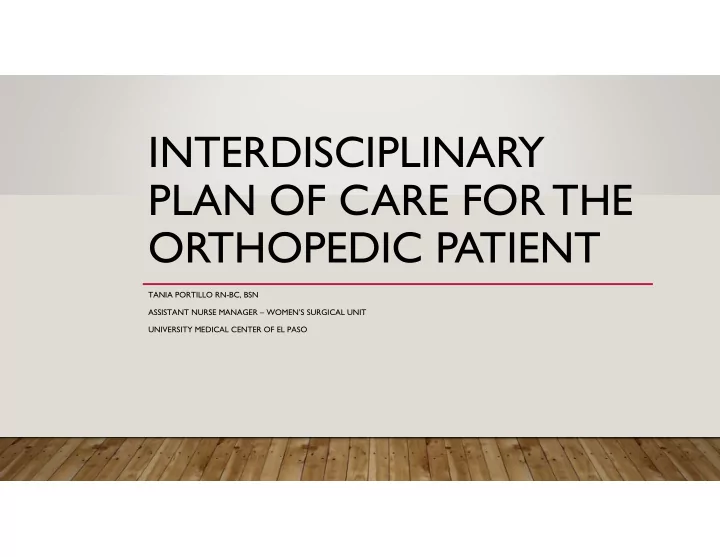

INTERDISCIPLINARY PLAN OF CARE FOR THE ORTHOPEDIC PATIENT TANIA PORTILLO RN-BC, BSN ASSISTANT NURSE MANAGER – WOMEN’S SURGICAL UNIT UNIVERSITY MEDICAL CENTER OF EL PASO
OBJECTIVES - T o assist and educate patient to play an active role in their care to improve pain control and have better outcomes - T o understand the importance of daily Plan of Care to maximize mobilization - T o collaborate with interdisciplinary team in regards to discharge planning
PREOPERATIVE TEACHING AND EDUCATION SURGICAL GUIDEBOOK (DSRIP PROJECT) *What to expect before and after your surgery? *What you will need to know during your hospital stay. *Different phases of care – Surgical/Orthopedic procedure
PREOPERATIVE TEACHING AND EDUCATION Hibiclens use the Pain SCD/anticoagulat Use of IS and Early night before and management ion therapy its importance mobilization the day of expectations surgery.
• Scheduled VS PRN pain medication • Medication information folder TEACHING PAIN • Set realistic goals for pain control MANAGEMENT • Coordinating physical therapy visits • Treating mild/moderate VS severe pain
PAIN MANAGEMENT (TEACH BACK METHOD) • https://www.youtube.com/watch?v=kBzzvsQ_B7M
INTERDISCIPLINARY TEAM Care Management Physician T eam Physical Nursing Therapy
DISCHARGE PLANNING Rehabilitation Placement Skilled Nursing Facility Ready to DC DME, anticoagulation therapy + Home Home Health VS Outpatient Rehab + Family teaching
• Nurse-patient ratio (5-6) Acute • Minimum of 3 hr of Inpatient combined therapy per day Rehab or 15 hrs over 7 days • Average LOS 12 days
• Nurse-patient ratio(15-20) • Therapy for less than 3 hr, Skilled frequently 1-2 hrs/day Nursing Facility • LOS 21-30 days or greater
WHAT IS DELAYING OUR DISCHARGES? Multiple High acuity comorbidities Insurance – Lack of rehab/SNF beds Increased LOS
DISCHARGE PLANNING STARTED ON DAY 1 • Pain management (weaning IV pain medication) • Placing Social Worker/Case Management Consult • Anticipating use of anticoagulation medication and obtaining script (Lovenox, Arixtra, Eliquis, etc) • Prescriptions for DME prior to day of discharge
READMISSION PREVENTION • MPOST screening tool (Martin Postoperative Discharge Screening Tool) Implemented by DSRIP program Evaluates patient’s vital signs, lab results, wounds, pain control, and ambulation status to determine whether patient is a high risk for readmission
CONCLUSION • Preoperative and continuous education • Set realistic goals with patient • Pain management is vital • Safe discharge in order to prevent readmission/complications
REFERENCES Landeiro, F., Leal, J., & Gray, A. M. (2015). The impact of social isolation on delayed hospital discharges of older Majeed, M.U., Williams, D.T., & Pollock, R. (2012). Delay in discharge and its impact on unnecessary hospital bed occupancy. BMC Health Services Research, 1-6 Watkins, J.R., Soto, J.R., & Bankhead-Kendall, B. (2014). What’s the hold up? Factors contributing to delays in discharge of trauma patients after medical clearance. The American Journal of Surgery, 969-973
Recommend
More recommend